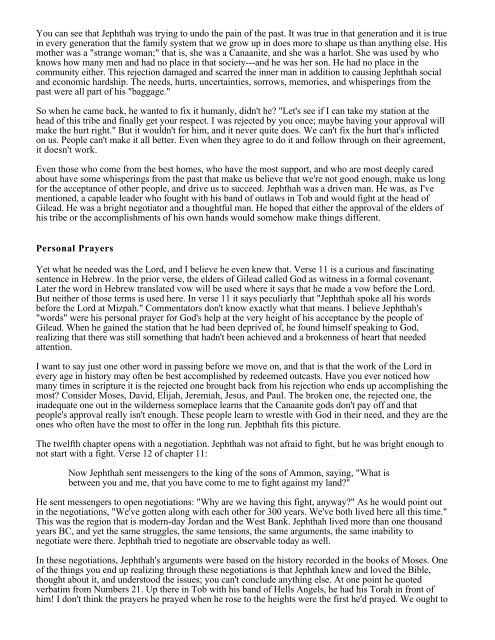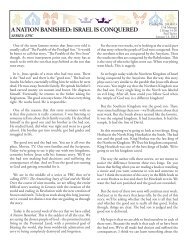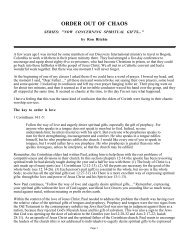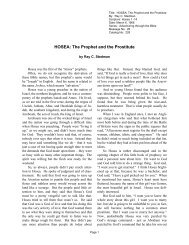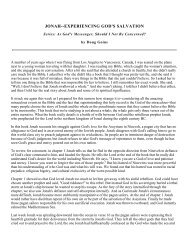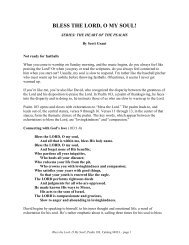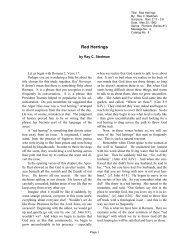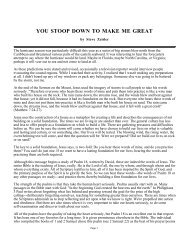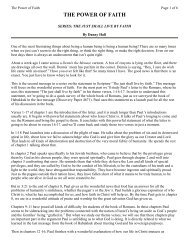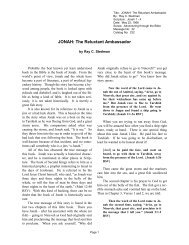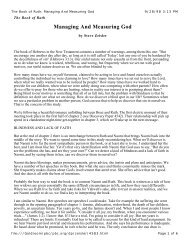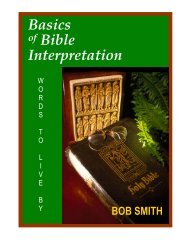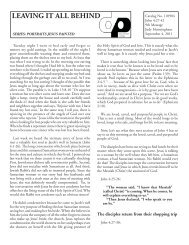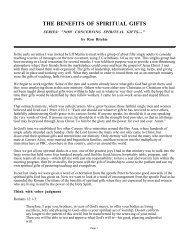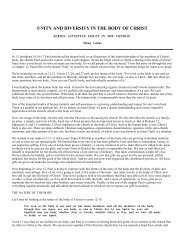FAILED FAMILIES, FAITH IN GOD - Peninsula Bible Church
FAILED FAMILIES, FAITH IN GOD - Peninsula Bible Church
FAILED FAMILIES, FAITH IN GOD - Peninsula Bible Church
You also want an ePaper? Increase the reach of your titles
YUMPU automatically turns print PDFs into web optimized ePapers that Google loves.
You can see that Jephthah was trying to undo the pain of the past. It was true in that generation and it is true<br />
in every generation that the family system that we grow up in does more to shape us than anything else. His<br />
mother was a "strange woman;" that is, she was a Canaanite, and she was a harlot. She was used by who<br />
knows how many men and had no place in that society---and he was her son. He had no place in the<br />
community either. This rejection damaged and scarred the inner man in addition to causing Jephthah social<br />
and economic hardship. The needs, hurts, uncertainties, sorrows, memories, and whisperings from the<br />
past were all part of his "baggage."<br />
So when he came back, he wanted to fix it humanly, didn't he? "Let's see if I can take my station at the<br />
head of this tribe and finally get your respect. I was rejected by you once; maybe having your approval will<br />
make the hurt right." But it wouldn't for him, and it never quite does. We can't fix the hurt that's inflicted<br />
on us. People can't make it all better. Even when they agree to do it and follow through on their agreement,<br />
it doesn't work.<br />
Even those who come from the best homes, who have the most support, and who are most deeply cared<br />
about have some whisperings from the past that make us believe that we're not good enough, make us long<br />
for the acceptance of other people, and drive us to succeed. Jephthah was a driven man. He was, as I've<br />
mentioned, a capable leader who fought with his band of outlaws in Tob and would fight at the head of<br />
Gilead. He was a bright negotiator and a thoughtful man. He hoped that either the approval of the elders of<br />
his tribe or the accomplishments of his own hands would somehow make things different.<br />
Personal Prayers<br />
Yet what he needed was the Lord, and I believe he even knew that. Verse 11 is a curious and fascinating<br />
sentence in Hebrew. In the prior verse, the elders of Gilead called God as witness in a formal covenant.<br />
Later the word in Hebrew translated vow will be used where it says that he made a vow before the Lord.<br />
But neither of those terms is used here. In verse 11 it says peculiarly that "Jephthah spoke all his words<br />
before the Lord at Mizpah." Commentators don't know exactly what that means. I believe Jephthah's<br />
"words" were his personal prayer for God's help at the very height of his acceptance by the people of<br />
Gilead. When he gained the station that he had been deprived of, he found himself speaking to God,<br />
realizing that there was still something that hadn't been achieved and a brokenness of heart that needed<br />
attention.<br />
I want to say just one other word in passing before we move on, and that is that the work of the Lord in<br />
every age in history may often be best accomplished by redeemed outcasts. Have you ever noticed how<br />
many times in scripture it is the rejected one brought back from his rejection who ends up accomplishing the<br />
most? Consider Moses, David, Elijah, Jeremiah, Jesus, and Paul. The broken one, the rejected one, the<br />
inadequate one out in the wilderness someplace learns that the Canaanite gods don't pay off and that<br />
people's approval really isn't enough. These people learn to wrestle with God in their need, and they are the<br />
ones who often have the most to offer in the long run. Jephthah fits this picture.<br />
The twelfth chapter opens with a negotiation. Jephthah was not afraid to fight, but he was bright enough to<br />
not start with a fight. Verse 12 of chapter 11:<br />
Now Jephthah sent messengers to the king of the sons of Ammon, saying, "What is<br />
between you and me, that you have come to me to fight against my land?"<br />
He sent messengers to open negotiations: "Why are we having this fight, anyway?" As he would point out<br />
in the negotiations, "We've gotten along with each other for 300 years. We've both lived here all this time."<br />
This was the region that is modern-day Jordan and the West Bank. Jephthah lived more than one thousand<br />
years BC, and yet the same struggles, the same tensions, the same arguments, the same inability to<br />
negotiate were there. Jephthah tried to negotiate are observable today as well.<br />
In these negotiations, Jephthah's arguments were based on the history recorded in the books of Moses. One<br />
of the things you end up realizing through these negotiations is that Jephthah knew and loved the <strong>Bible</strong>,<br />
thought about it, and understood the issues; you can't conclude anything else. At one point he quoted<br />
verbatim from Numbers 21. Up there in Tob with his band of Hells Angels, he had his Torah in front of<br />
him! I don't think the prayers he prayed when he rose to the heights were the first he'd prayed. We ought to


